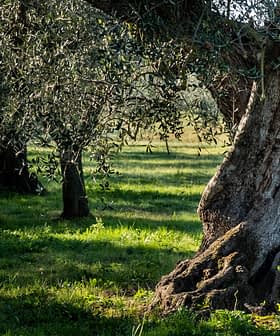Bringing Peloponnesian Flavors to American Kitchens

When Greek-American Katerina Mountanos settled in the United States and started a family, she was disappointed with the taste of most of the Greek olive oils sold in American supermarkets.
“As I started my own family, I began cooking more at home,” Mountanos told Olive Oil Times. “I found that the Greek extra virgin olive oil at the supermarket here tasted nothing like what my family produced and enjoyed in Greece.”
Despite growing up mainly in London and New York, Mountanos spent her childhood summers at that family’s home in the small picturesque town of Koroni in southern Peloponnese.
See Also:Producer Profiles“This idyllic village has always represented true Greece,” she said. “I’m not sure if I can capture in words the sound of the sea, the smell of salt, and the taste of olive oil.”
Koroni is considered to be the origin of the Koroneiki olive variety. In the 19th century, the town developed rapidly, and the local economy grew based on olive oil, raisin and pottery production.
“I grew up knowing what good olive oil tastes like,” Mountanos said. ”I knew I wanted to bring the good stuff to the U.S.”
Before venturing into the world of olive oil production, Mountanos also took an olive oil sommelier course to dig deeper into the merits and qualities of extra virgin olive oil.

Katerina Mountanos founded Kosterina to bring Pelopponesian extra virgin olive oil and table olives to the United States. (Photo: Kosterina)
“I was blown away by the health benefits of olive oil when [the olives are] harvested early and milled properly,” she said. “I learned about the polyphenols found in extra virgin olive oil and the story of the research team that discovered them.”
“I decided to focus my efforts on making an extra virgin olive oil that is authentically Mediterranean, delicious to smell, taste, and cook with, and, above all, loaded with health benefits,” Mountanos added.
Olive oil polyphenols, such as oleuropein, hydroxytyrosol and oleocanthal, are naturally occurring plant compounds acting as antioxidants.
Oleocanthal, in particular, found solely in extra virgin olive oil, has been shown to have the same effects on the human body as ibuprofen, an anti-inflammatory drug that relieves pain, fever and inflammation.
Kosterina, the company founded by Mountanos (also known as Katina) and her husband Kostas, launched its first brand of bottled olive oil in 2020. The high-phenolic Kosterina Original extra virgin olive oil is made from early-harvested Koroneiki olives grown in southern Peloponnese.

Kosterina also cures Kalamata and green Konservolia table olives. (Photo: Kosterina)
Since then, Kosterina has expanded its line of olive oils to include the Kosterina Everyday olive oil, an organic extra virgin olive oil best suited for cooking and baking, and the line of flavored extra virgin olive oils with Greek herbs and garlic.
“Premium, high-polyphenol extra virgin olive oil has always been at the core of our brand,” Mountanos said. “We want to help people live longer, more delicious lives.”
“Taste is an indicator of quality, and too many Americans are not only missing out on irresistible extra virgin olive oil flavor but also the antioxidant superpowers derived from olives harvested early,” she added.
Commitment to quality and authenticity has paid off for Kosterina, earning the company a Silver Award at this year’s NYIOOC World Olive Oil Competition for the Kosterina Original monovarietal, its first participation in the competition.

The harvest begins at Kosterina’s olive groves in Koroni. (Photo: Kosterina)
Unsurprisingly, Mountanos’ Greek ancestry and passion for authentic Greek flavors have also brought her into the table olive business; a recent addition to Kosterina’s Mediterranean range of products is the company’s naturally-cured Kalamata and green Konservolia table olives.
Once again, Mountanos traveled back to her childhood to find the tools she believed would
better suit Kosterina’s new project.
“When I was young and spent my summers in Koroni, my grandmother and other locals would tie a bag of olives from the house and let them cure in the sea for months,” Mountanos said.
“Almost all the olives I was seeing here in the U.S. were flavorless black olives that have most likely been cured in lye, which strips all the healthy nutrients from the olive,” she added. “So, when we found our producer in Greece who cured their olives naturally in sea salt, we knew we had found the right producer to bring high-quality Greek olives to the United States.”

Kosterina earned a Silver Award at the 2024 NYIOOC World Olive Oil Competition. (Photo: Kosterina)
According to one source, the first olives cured in salt water were accidentally discovered afloat somewhere in the Greek seas in ancient times: in his epic poem Aeneid of the 1st century BC, Roman poet Virgil tells the story of a Greek fisherman who found olives floating in the water while fishing. After tasting them, he realized they had shed their bitter taste and offered a unique flavor.
Mountanos said that the natural curing of olives in sea salt brine for six to 12 months results in fermented olives with high levels of probiotics, the bacteria considered essential for a healthy gut.
“Extra virgin olive oil gets all the heart-healthy buzz, but olives are a powerhouse of essential nutrients in their own right,” she added. “Olives are also rich in monounsaturated fats, which promote cardiovascular health and contain iron, copper, calcium and fiber.”
“I consider myself lucky, and I want to share the remarkable treasures of southern Greece the best I can,” Mountanos said. “My hometown, Koroni, and the memories my family and I have created there are interwoven with everything we do at Kosterina.”
“Our mission is to continue to prove that healthy can also be delicious and that the modern Mediterranean diet is the best for overall health,” she concluded.








